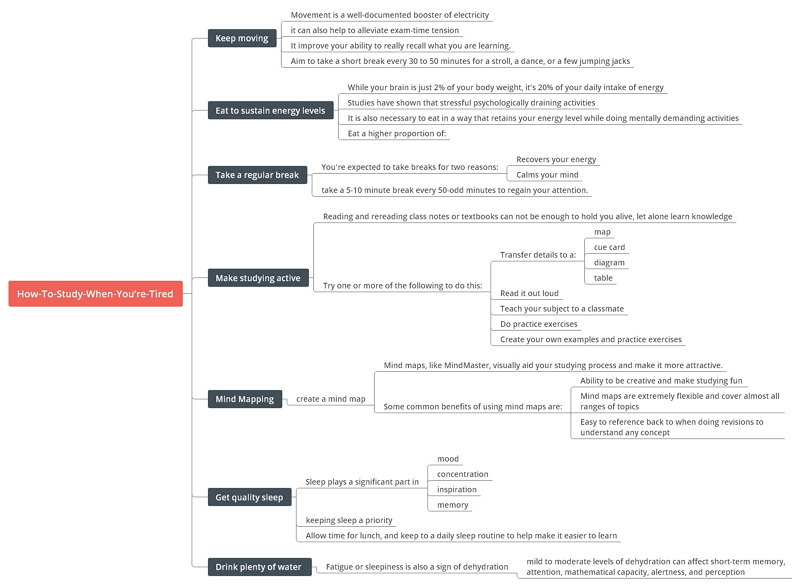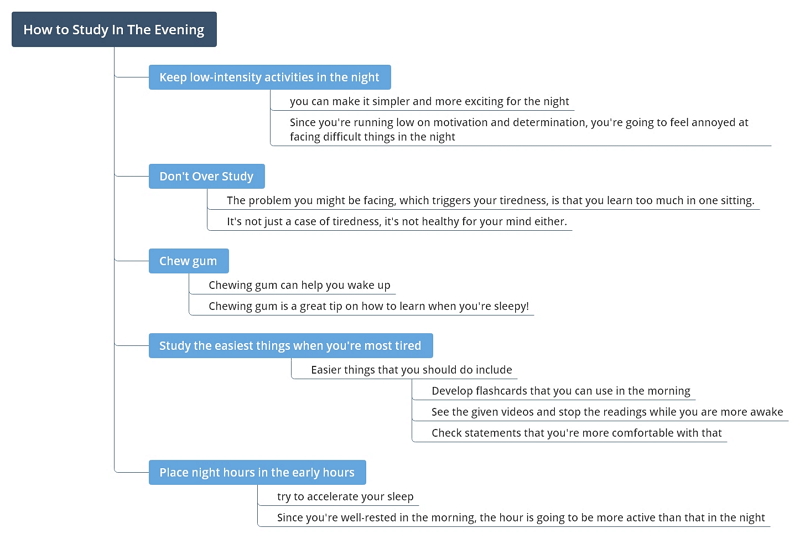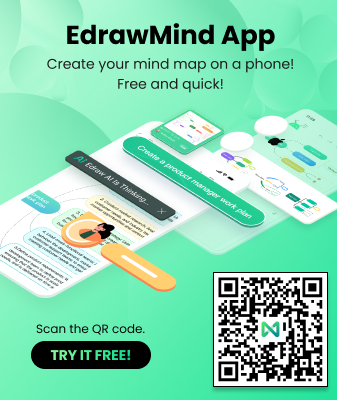How to Avoid Sleepiness While Studying

Generally, in today's age, we are aware of the importance of education and its role in shaping an individual's life. Some people study to secure excellent grades, but for some, it's just a compulsion, since they don't have any other choice. Learning is never useful if you're too exhausted, so it's pointless to learn if you're exhausted. Some tips will help you learn how to study when you're tired.
Three easy ways to make sure you study when you're tired:
- Drink water
- Take short naps
- Decrease screen time
The motivation and passion for the study would directly influence productivity. Hence, when you're tired, you will have no intention to study, yet the deadline reminds you that you should finish your work asap. As a result, mastering specific efficient tips for learning when you're tired seems far more critical.

Source: EdrawMind
1. Keep moving
Moving around will help your body's muscles expand. In addition to helping you stay awake, it can also help alleviate exam-time tension and improve your ability to recall what you are learning effectively.
Research indicates that students of all ages — from elementary school to college — found that 10 minutes of outdoor walking significantly increased memory efficiency, problem recognition, and quantitative problem-solving activities.
Aim to take a short break every 30 to 50 minutes for a stroll, a dance, or a few jumping jacks.
2. Eat to sustain energy levels
While your brain is just 2% of your body weight, it's 20% of your daily intake of energy. Studies have shown that stressful psychological activities can exhaust an individual as much as physical work can.
Therefore, it is necessary to eat to retain your energy level while doing demanding activities like high power studying sessions.
Eat rice, porridge, low-sugar muesli, granola bars, cereal with seeds/nuts, low-fat milk, soups, vegetables, wholegrain, and most fruits that are steadily release glucose the bloodstream, retaining energy levels for a more extended period.
3. Take regular breaks
Pause. Stop forcing yourself to sit through extended study sessions. It will affect your productivity and retention of information and have adverse effects on your mental health. You're expected to take breaks for two reasons. Not only does it calm you, but it also recovers your deteriorating concentration.
Your focus tends to decrease after about 50 minutes or so. If you choose to continue studying further, you'll continue learning with lesser emphasis, which is the equivalent of wasting time. So, take a 5-10 minute break every 50-odd minutes to regain your attention.
4. Make studying active
Reading and rereading class notes or textbooks is not enough to hold your attention, let alone learn knowledge.
Straighten up. Stop learning like its a chore. You can learn how to study when you're tired of using constructive learning strategies. Try one or more of the following tips listed below:
- Transfer details to a map, cue card, diagram, table, or another visual medium;
- Read it out loud;
- Teach your subject to a classmate;
- Do practice exercises;
- Create your examples and practice exercises.
5. Use mind maps
The best way to study, especially when you don't feel like it, is to create a mind map. Mind maps visually aid your studying process and make it more attractive. Some expected benefits of using mind maps;
- Ability to be creative and make studying fun;
- Mind maps are incredibly flexible and cover almost all ranges of topics;
- Easy to reference back to when doing revisions to understand any concept.
EdrawMind is a powerful mind mapping tool which supports to make mind maps with ease, and present it with presentation mode.
6. Get quality sleep
Sleep plays a significant part in mood, concentration, inspiration, and memory — all of which affect learning. It's no joke that poor sleep is associated with low academic success.
In reality, keeping sleep a priority — both short-term and long-term — is the most successful way to keep yourself alert when you are studying. Allow time for breaks and support to a daily sleep routine to help make learning easier.
Your productivity will drastically decrease when you don't nap, which means that you can work at a high pace even late in the evening if you've had a nap in the afternoon. Your body needs proper rest. Don't shy away from taking care of your health.
7. Drink plenty of water
Fatigue or sleepiness are signs of dehydration. Although dehydration doesn't only affect your energy levels, it may even impair cognitive processes, making it almost impossible to study.
Dehydration affects your brain activity and can slow you down. Studies have stated that mild to moderate dehydration levels can affect short-term memory, attention, mathematical capacity, alertness, and perception.
To make sure you don't doze off while studying, stay hydrated all day.
Some people get used to studying in the morning, yet some like learning at night. Here are some tips for studying in the evening, which could result in higher concentration and resolution.

Source: EdrawMind
1. Keep low-intensity activities in the night
Ideally, you should keep the low energy studying sessions for the night time. Since you're running low on motivation and determination, you're going to feel annoyed when dealing with complex concepts in the night. And if you're stuck, with almost zero productivity, the best thing to do is to call it a day.
2. Don't over study
The factor of your drowsiness, which triggers your tiredness, is that you learn too much in one sitting.
It's not just a case of tiredness -- it's not healthy for your mind either. Well-known research showed that smaller volumes of studying spread over a week were safer for your brain than a lot of cramming done in one day. Break your studying into smaller chunks.
3. Chew gum
Chewing gum can help you wake up. Chewing gum is an excellent tip on how to learn when you're sleepy!
Scientists are not entirely sure that this is the case, but randomized controlled experiments have shown that people are more alert and better at interpreting information while chewing gum.
4. Study the most straightforward things when you're most tired
The worst thing that you can do is study difficult concepts when you're tired. Instead, keep the more straightforward studying tasks like revising formulas or reading literature for the night.
Easier things that you should do include:
- Develop flashcards that you can use in the morning;
- See the given videos and do some quality readings of a text;
- Check statements that you're more comfortable with.
5. Place night hours in the early hours
If you go to bed at 11 o'clock in the night and get up at 6 a.m. to leave your house at 8 o'clock, try to accelerate your sleep and get up by, say, one hour earlier (i.e., sleep at 10 o'clock and get up at 5 o'clock) to use the extra morning to prepare. Since you're well-rested in the morning, the hour will be more active than that in the night.
Staying alert and concentrated can be a challenge when you need to learn, particularly at the end of a long day. Yet there are ways to improve your alertness and stop nodding off in the middle of a study session. You can learn how to study when you’re tired of using constructive learning strategies.
EdrawMind is the perfect mind mapping program. With the pre-made templates, the specialized map-making tool can help you quickly create your mind map and reduce the time required to ensure that your study session is productive.







